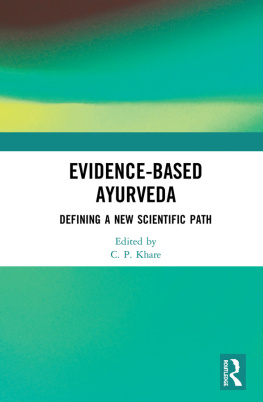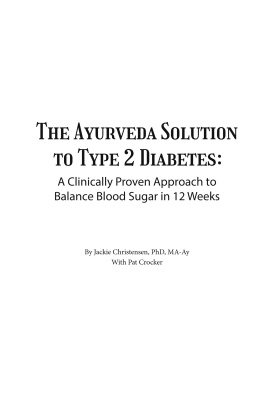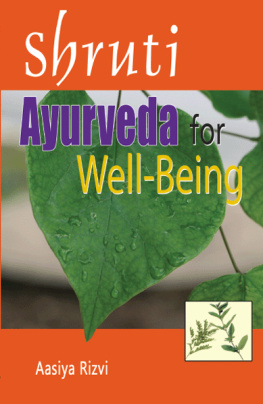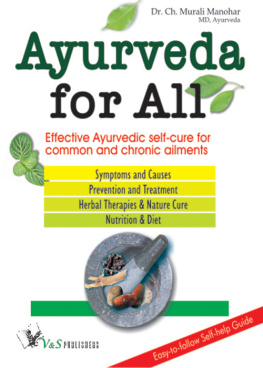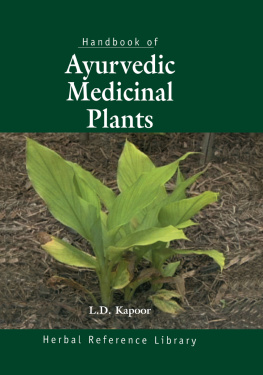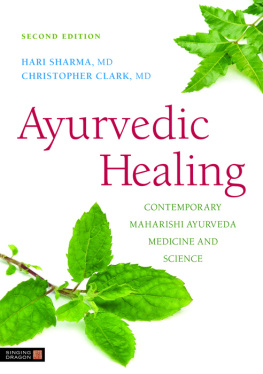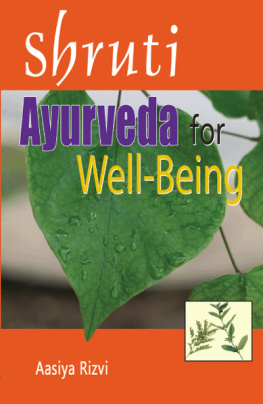Evidence-based Ayurveda
This groundbreaking work calls for an overhaul of traditional Ayurveda and its transformation into a progressive, evidence-based medicinal system.
This book begins by looking back at the research of the last three centuries, Indian medicinal plants, and Ayurveda in a twenty-first-century context. The first part of this book explores the limitations of contemporary Ayurvedic pharmacognosy and pharmacology, discussing the challenges the practice faces from research and clinical trials. It makes a compelling argument for the necessity of change. The second part of the book defines and elaborates upon a new, scientific path, taking the reader from identification of the herb through all stages of drug development.
An essential tool for herbal drug development, this text is designed for knowledgeable students, practitioners, and scholars of Ayurveda, pharmacy, and herbal medicine.
C. P. Khare is the founder president of the Society for New Age Herbals, a forum for promoting evidence-based herbal medicine, in New Delhi, India. He has been an herbalist, herbal drug consultant, and herbal historian for more than 60 years.
The Old Order Changeth
Yielding Place to New
Evidence-based Ayurveda
Defining a New Scientific Path
Edited by
C. P. Khare

First published 2020
by Routledge
2 Park Square, Milton Park, Abingdon, Oxon OX14 4RN
and by Routledge
52 Vanderbilt Avenue, New York, NY 10017
Routledge is an imprint of the Taylor & Francis Group, an informa business
2020 selection and editorial matter, C. P. Khare; individual chapters, the contributors
The right of C. P. Khare to be identified as the author of the editorial material, and of the authors for their individual chapters, has been asserted in accordance with sections 77 and 78 of the Copyright, Designs and Patents Act 1988.
All rights reserved. No part of this book may be reprinted or reproduced or utilised in any form or by any electronic, mechanical, or other means, now known or hereafter invented, including photocopying and recording, or in any information storage or retrieval system, without permission in writing from the publishers.
Trademark notice: Product or corporate names may be trademarks or registered trademarks, and are used only for identification and explanation without intent to infringe.
British Library Cataloguing-in-Publication Data
A catalogue record for this book is available from the British Library
Library of Congress Cataloging-in-Publication Data
A catalog record for this book has been requested
ISBN: 978-0-367-35709-2 (hbk)
ISBN: 978-0-429-34126-7 (ebk)
Typeset in Times New Roman
by Apex CoVantage, LLC
Contents
Part I
The legacy and logical steps for a new therapeutic regimen
Part II
Defining a new scientific path by switching over to modern pharmacognosy, pharmacology and research protocols
vikram andrew naharwar
r. c. saxena
Vikram Andrew Nahaewar is a third-generation herbalist. For 23 years he has been Director of Indias first private-sector R&D laboratory, Amsar, which has been recognized by the Department of Scientific Industrial Research of India. He participated in the System of Conferences on Medicinal & Aromatic Plants, Vienna, 1997, organized by the United Nations Industrial Development Organization (UNIDO). Dr. Naharwar is Chief Scientific Officer at Integrated Clinical Research Sciences, an Indian CRO that has conducted clinical trials for global pharmaceutical companies, such as Pfizer, Aventis, GSK and Panacea Biotech. In 2001 he was nominated by the Central Drug Laboratory, Government of India, to the subcommittee of the Official Indian Pharmacopoeia. He has authored numerous articles on herbal medicines, including the Official Indian Pharmacopoeia monographs, and is a member of the review committee of the Indian Herbal Pharmacopoeia.
Kishor Patwardhan is currently a professor in the Department of Kriya Sharir, Faculty of Ayurveda, Banaras Hindu University. His doctoral work was on identifying issues, concerns and challenges of Ayurveda education in India. He is involved in developing tools for the assessment of Ayurveda parameters, such as Prakriti and Agnibala. He has lectured on various platforms in India and abroad on topics such as academic writing, research methodology, educational research, education policy and Ayurveda physiology. He has received the AYUSH-sponsored Vaidya-Scientist Fellowship from Transdisciplinary University (TDU), Bengaluru, and has recently been awarded the Dr. C. Dwarikanath Award from the Indian Association for Study of Traditional Asian Medicine (IASTAM) for newer interpretations of Ayurveda principles. He has authored important papers on education policies and research practices. His research interests include Ayurveda biology, Ayurveda education and policies on higher education. He has worked as a member of many scientific advisory committees, editorial boards and task forces.
R. C. Saxena, MBBS, MD, DIP CLIN PHARMOCOL (UK), MNASc, MNAMS, FIAMS, FIMSA, was Former Director and Head, Pharmacology, and Director Pharmacy, King Georges Medical University, Lucknow. He was the first Indian Clinical Pharmacologist qualified from the UK and trained at Hammersmit, Royal Postgraduate Medical School, University of London. Dr. Saxena occupied first faculty position in Pharmacology, represented India at the First Clinical Pharmacology and Therapeutics (CPT) conference in London and was also the first Indian faculty member of the International Union of Basic and Clinical Pharmacology (IUPHAR) conference in Japan. His first work in the field of herbal medicine was related to clinical evaluation of Glycyrrhiza Glabra in Bockharts Impetigo, Pemphigus and other diseases on anti-inflammatory activity of a dual drug containing Withania ashwagandha and Cyperus rotundus. He is developing drugs for Alopecia and Vitiligo. He also published several books, in addition to a number of research papers in national and international journals.
During the classical period, Ayurveda was a holistic medicine. First, the Dosha was identified; then, the first component of the herb, Rasa (taste), was selected. Rasa was considered an important marker which indicated, initially, the right choice of the herb to treat not only symptoms but also the whole system by synchronizing Doshas, Vaata, Pitta and Kapha, collectively known as Tridoshas; Tridoshas represent the constitution of the patient. Thus, Ayurveda was a holistic, individually tailored medicine and was aimed at treating the whole person (body, mind, spirit and emotions). Ayurveda, as a Vedic medicine, was also employed by Hindu priests, preachers and yogis, while it is neither a holy medicine nor exclusively a Hindu medicine. Thus, Ayurveda remained the most employed medicinal system. The restructuring of Ayurveda, until now, was not possible because of stiff resistance from the exponents of holistic (holy) medicine.
With the introduction of the Linnaean system, Sanskrit names were converted to botanical names. That opened the gates of India for botanists and European plant collectors. The British passed the baton to scientists, pharmacognosists and pharmacologists. Holistic medicine was caught between two worlds. The only way out was to call Ayurveda a science disease-specific, not

